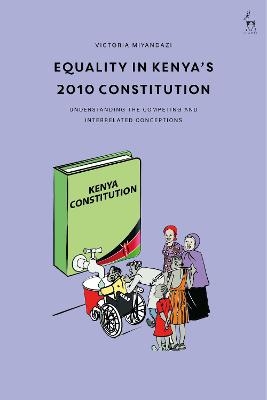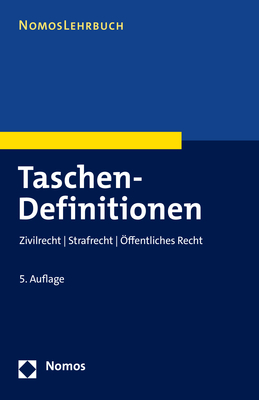
Equality in Kenya’s 2010 Constitution
Hart Publishing (Verlag)
978-1-5099-4529-0 (ISBN)
Taking a comparative approach, the book considers how other jurisdictions including the United States, United Kingdom, Canada, South Africa, India and Botswana have approached the conceptualisation, interpretation and application of various equality concepts.
The book focuses on important issues such as:
- transformative constitutionalism in relation to the interpretation of Kenya's 2010 Constitution;
- expanding the list of enumerated grounds for non-discrimination;
- affirmative action;
- accommodating religious and cultural diversity versus gender equality;
- the interrelation between socio-economic rights and status-based equality.
Victoria Miyandazi is Researcher for the Oxford Human Rights Hub, University of Oxford, UK.
1. Introduction
2. Interpretation of Kenya’s 2010 Constitution
I. The Transformative Nature of Kenya’s 2010 Constitution and its Effect on Constitutional Interpretation
II. Constitutional Interpretation under the Previous Kenyan Constitution
III. Interpretation of Kenya’s 2010 Constitution
IV. Conclusion
3. Multiple and Competing Conceptions of Equality
I. Historical Overview of Inequalities and Discrimination in Kenya
II. What Understandings of Equality are Encapsulated in Article 27 and Related Provisions of the Constitution?
III. To What Extent Does the Constitution’s Equality Guarantee Advance Transformative Constitutionalism?
IV. Conflicting Interpretations of Equality in Recent Case Law
V. Conclusion
4. Grounds for Non-discrimination
I. Laying the Background
II. The 2010 Constitution’s Inclusion of a Non-exhaustive List of Grounds and the Court’s Role in Expanding the List of Grounds
III. What Considerations are or Should be Taken into Account in Expanding the List of Grounds for Non-discrimination in Article 27(4)? Lessons from Canada and South Africa
IV. Do Kenyan Courts in Current Cases Apply the Identified Requisites When Considering Unenumerated Grounds? Should They?
V. What Do the Principles Unifying the List of Grounds Reveal About the Underlying Approach to Equality in the Constitution?
VI. Conclusion
5. Conceptualisation and Application of Affirmative Action
I. Affirmative Action Measures in the Kenyan Constitution
II. Aims of Affirmative Action as Evident from Constitutional Provisions
III. Determining the Beneficiaries – Principle of Genuine Need
IV. Are Affirmative Action Measures Mandatory and Immediate or Should They be Progressively Realised?
V. Role of Courts and Judicial Scrutiny in Affirmative Action Cases
VI. Conclusion
6. Competing Equalities: Religion, Culture and Gender Equality
I. Culture, Religion and Gender Equality in the 2010 Constitution
II. Key Rationales for the Right to Culture and Religion Analysed Th rough the Lens of Harmful Practices that Violate Gender Equality
III. Proposed Approaches to Balancing between Gender Equality and Accommodating the Right to Culture and Religion
IV. Exemption of Islamic Personal Law from the Automatic Application of Equality Provisions in the Bill of Rights and What this Means for Gender Equality
V. Conclusion
7. The Interrelationship between Socio-economic Rights and Status-based Equality
I. Interrelationship between Socio-economic Rights and Status-based Equality in the Kenyan Constitution
II. Establishing the Analytical Framework for Linking Socio-economic Rights (Redistributive) and
Status-based Equality
III. Applying the Analytical Framework to Kenya
IV. Pulling it All Together
V. Conclusion
8. Interrelationship between Socio-economic Rights and Status-based Equality in Current Kenyan Jurisprudence
I. Access-to-justice Challenges that Warrant an Equality-sensitive Approach to Socio-economic Rights Adjudication
II. Prioritisation of Socio-economic Needs of Vulnerable Groups
III. Desirability of an Equality-sensitive Approach in Setting Standards of Review for Assessing Socio-economic Rights Claims
IV. Conclusion
Conclusion: Finding Harmony
| Erscheinungsdatum | 19.10.2022 |
|---|---|
| Verlagsort | Oxford |
| Sprache | englisch |
| Maße | 156 x 234 mm |
| Themenwelt | Recht / Steuern ► Allgemeines / Lexika |
| Recht / Steuern ► EU / Internationales Recht | |
| Recht / Steuern ► Öffentliches Recht | |
| Sozialwissenschaften ► Politik / Verwaltung | |
| ISBN-10 | 1-5099-4529-6 / 1509945296 |
| ISBN-13 | 978-1-5099-4529-0 / 9781509945290 |
| Zustand | Neuware |
| Haben Sie eine Frage zum Produkt? |
aus dem Bereich


